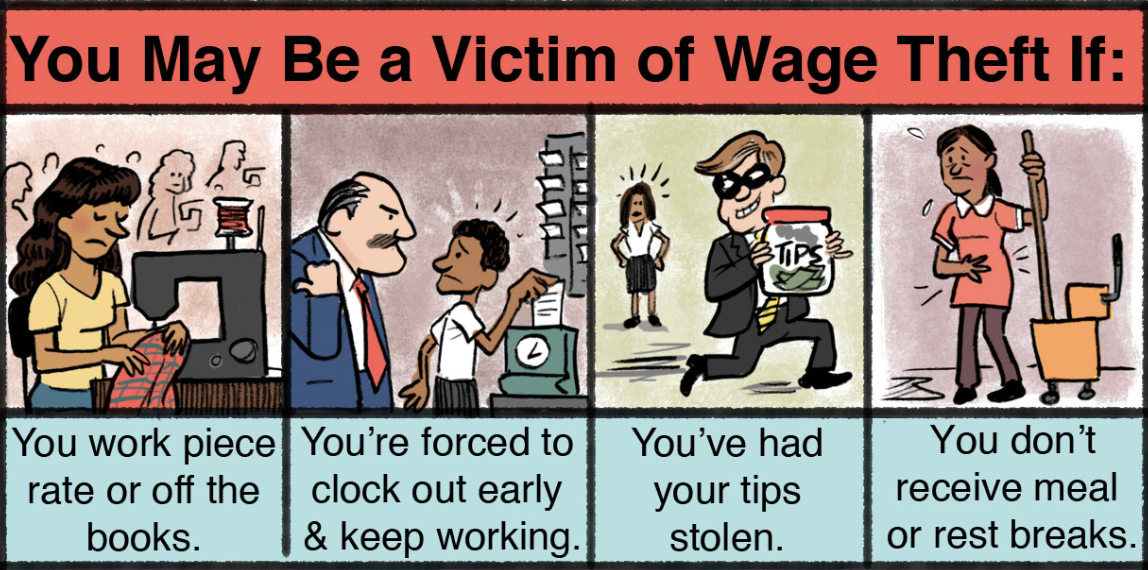Los Angeles is taking a major step toward protecting workers from wage theft, the widespread and largely unpunished practice of employers withholding legally earned pay. A new report released by the Chief Legislative Analyst, requested through a motion by Councilmembers Hugo Soto-Martínez, Tim McOsker, and Marqueece Harris-Dawson, lays out a roadmap for the city to finally hold bad employers accountable.
The scale of the problem is staggering: corporations steal an estimated $1.4 billion in wages from Los Angeles workers each year, making the city the wage theft capital of the United States. Studies show that 88 percent of low-wage workers in the city experience some form of wage theft, losing on average 12.5 percent of their annual income. For many, that loss can mean missing rent or falling into homelessness. A recent UCSF study found that loss of income is the leading cause of homelessness, three times more common than substance use or other causes among tenants who lose their housing.
Currently, the City’s Office of Wage Standards (OWS) within the Bureau of Contract Administration can only enforce the city’s minimum wage ordinance. That narrow authority leaves the vast majority of violations, including unpaid overtime, skipped breaks, and delayed paychecks, entirely uninvestigated. The report recommends a set of reforms to close those gaps, including expanding OWS’s power to enforce state labor laws, giving investigators subpoena authority, and prioritizing low-wage workers in enforcement.
Under the proposal, OWS would gain authority to investigate and penalize employers for overtime, meal break, rest break, and late pay violations, which make up the bulk of wage theft cases. It would also be empowered to issue administrative subpoenas directly, cutting through the red tape that currently allows employers to stall investigations by forcing the agency to seek approval from the Board of Public Works. The report further calls for the creation of a public online database listing employers found to have violated wage laws, modeled after Seattle’s Office of Labor Standards, to deter future misconduct through transparency and public accountability.
Another major recommendation is to adopt a triage system that prioritizes complaints from low-wage and high-impact cases, such as those in restaurants, retail, and cleaning services where violations are most common. The Office would also proactively target sectors with historically high rates of abuse and strengthen collaboration with trusted community organizations that can help workers come forward, particularly those who are undocumented or fearful of retaliation.
Implementing the plan would cost an estimated $2.8 million over nine months, funding that would allow the City to hire 13 to 16 new staff across OWS and the City Attorney’s office. Supporters argue that is a small price to pay considering the potential return: recovering hundreds of millions in stolen wages and deterring further theft. “For less than $4 million a year, Los Angeles could finally have the tools to fight wage theft at scale,” said a representative from Soto-Martínez’s office. “That is a direct investment in working families and in our local economy.”
The report also points to the broader stakes. Because wage theft disproportionately affects immigrants and workers of color, effective enforcement could help reduce inequality and prevent homelessness. By giving workers back the money they have already earned, the City could simultaneously tackle poverty and economic instability at their root.
The Economic Development and Jobs Committee is expected to take up the report’s recommendations in the coming weeks before sending them to the full City Council for a vote. If adopted, the changes would mark Los Angeles’s most ambitious effort yet to curb wage theft and to send a clear message that stealing from workers will no longer be tolerated in the nation’s second-largest city.

